新人教七年级下Unit 1 课堂笔记
人教新目标英语七年级下册unit 1 课堂思维导图笔记

Section B 考点解析
2. Are you free in July?
你七月份有空吗?
Section B 考点解析
3. Are you good with old people?
你善于与老年人相处吗?
Section B 考点解析
4. They can tell you stoies, and you can make friends.
speaker
说话者,演讲者
speak English
说英语
First think, and then speak.
三思而后行
Section A 重点词汇
8. join 参加,加入
Come and join us, Mike.
join sb.
加入某人
join 动词
连接,联合
Section A 重点词汇
1. play chess
下国际象棋
play tห้องสมุดไป่ตู้e guitar
弹吉他
Section A考点解析
2. I want to join the art club.
我想参加美术社团。
Section A考点解析
3. Can you draw?
你会画画吗?
Can you sing English song?
请放学后和张老师谈。
Don’t sit on the chair. It is wet.
Section A考点解析
1. I can speak English and I can also play soccer.
我会说英语,我也会踢足球。
I also like math. He is also a student.
人教版七年级下册英语1-12单元学霸笔记
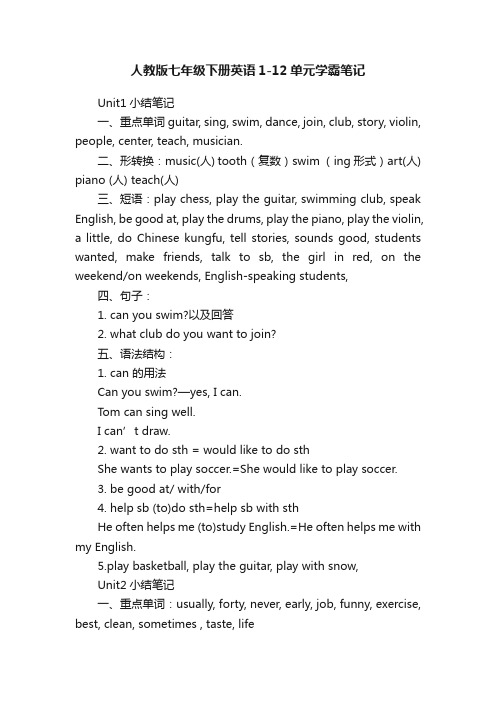
人教版七年级下册英语1-12单元学霸笔记Unit1小结笔记一、重点单词guitar, sing, swim, dance, join, club, story, violin, people, center, teach, musician.二、形转换:music(人) tooth(复数)swim (ing形式)art(人) piano (人) teach(人)三、短语:play chess, play the guitar, swimming club, speak English, be good at, play the drums, play the piano, play the violin, a little, do Chinese kungfu, tell stories, sounds good, students wanted, make friends, talk to sb, the girl in red, on the weekend/on weekends, English-speaking students,四、句子:1. can you swim?以及回答2. what club do you want to join?五、语法结构:1. can 的用法Can you swim?—yes, I can.Tom can sing well.I can’t draw.2. want to do sth = would like to do sthShe wants to play soccer.=She would like to play soccer.3. be good at/ with/for4. help sb (to)do sth=help sb with sthHe often helps me (to)study English.=He often helps me with my English.5.play basketball, play the guitar, play with snow,Unit2小结笔记一、重点单词:usually, forty, never, early, job, funny, exercise, best, clean, sometimes , taste, life二、词形变换:tooth(复数) early (反义词)job(同义词)run(名词)life(复数)三、短语:get up, get dressed, take a shower, radio station, at night, on weekends, half an hour, a quarter to ten, do one’s homework, take a walk, e ither…or…, lots of, go to school/work, an interesting job, eat dinner, half past six, go home, go to bed early, eat quickly, get home, after school,四、句子:1、what time do you usually get up?2、when does she go to work?3、I sometimes play basketball for half an hour.4、that’s a funny time for breakfast.五、语法结构:1、when/what time +do/does+主语+动词原形+其他?2、时间表达法:顺读法如:7:20读作seven-twenty倒读法:此方法是“先读分钟数”,再读“钟点数”,使用此方法要注意两点:A、如果分钟数在30以内,就用“分钟数+past+钟点数”表示,介词past意为“过”。
Unit 1笔记22-23人教版英语七下
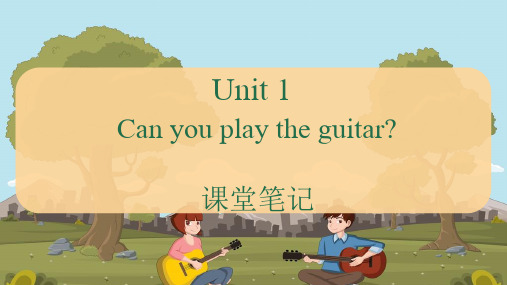
Language points 1.I can speak English and I can also play soccer.
Point
我会说英语,而且我也会踢足球。
①I like apples and pears.
我喜欢苹果和梨。
②Jim can play the violin, but he can't play it well. 吉姆会拉小提琴,但是拉得不好。
Language points 1.I can speak English and I can also play soccer.
Point
我会说英语,而且我也会踢足球。
③—Can you sing or dance?
你会唱歌或跳舞吗?
—I can't sing or dance.
我不会唱歌和跳舞。
Language points 2.Lisa wants to join the chess club.
丽萨想要加入国际象棋俱乐部。
Point
①I want a cake for my birthday. 我想要一个生日蛋糕。 ②He wants me to go with him. 他想让我跟他一起走。 ③He wants to help me. 他想要帮助我。
感谢您的观看与指正!
Language points 2.help sb.(to) do sth.帮助某人做某事
Point
还可以说 help sb.with sth.
如:She helps us (to) learn English.
=She helps us with our English. 她帮助我们学英语。
Language points 3.be good with/to/at/for
七年级下册英语第一单元笔记整理
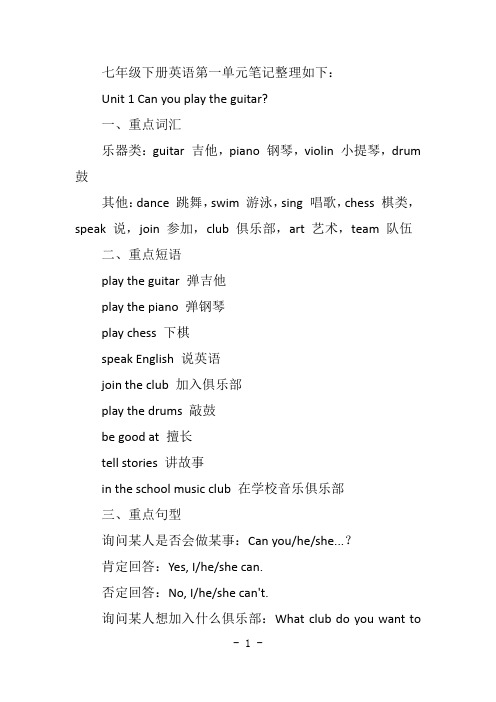
七年级下册英语第一单元笔记整理如下:Unit 1 Can you play the guitar?一、重点词汇乐器类:guitar 吉他,piano 钢琴,violin 小提琴,drum 鼓其他:dance 跳舞,swim 游泳,sing 唱歌,chess 棋类,speak 说,join 参加,club 俱乐部,art 艺术,team 队伍二、重点短语play the guitar 弹吉他play the piano 弹钢琴play chess 下棋speak English 说英语join the club 加入俱乐部play the drums 敲鼓be good at 擅长tell stories 讲故事in the school music club 在学校音乐俱乐部三、重点句型询问某人是否会做某事:Can you/he/she...?肯定回答:Yes, I/he/she can.否定回答:No, I/he/she can't.询问某人想加入什么俱乐部:What club do you want tojoin?谈论某人擅长什么:I/He/She is good at...询问某人擅长什么:What are you good at?谈论某人可以做什么:I/He/She can...四、语法重点情态动词can的用法:表示能力,意为“能,会”。
在一般现在时中,当主语为第三人称单数时,使用“can + 动词原形”。
否定形式为“can't”。
疑问句形式将“can”提前到句首。
特殊疑问句:What club do you want to join? 你想加入什么俱乐部?What are you good at? 你擅长什么?五、拓展知识了解不同乐器的英文名称,学习如何用英语描述自己的兴趣和特长,如:“I can play the guitar and I am good at it.”(我会弹吉他,而且我很擅长。
新人教版七年级下册unit1知识点总结
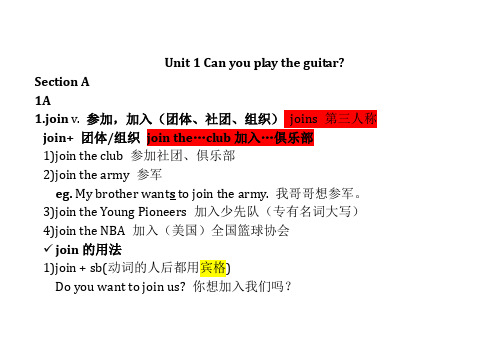
Unit 1 Can you play the guitar? Section A1A1.join v. 参加,加入(团体、社团、组织)joins 第三人称join+ 团体/组织join the…club加入…俱乐部1)j oin the club 参加社团、俱乐部2)j oin the army 参军eg. My brother want s to join the army. 我哥哥想参军。
3)j oin the Young Pioneers 加入少先队(专有名词大写)4)j oin the NBA 加入(美国)全国篮球协会✓join的用法1)join + sb(动词的人后都用宾格)Do you want to join us? 你想加入我们吗?2)join + sb(宾格)+for thingI want you to join us for the concert.我想让你加入我们一起准备音乐会。
3)join + sb(宾格)+to do somethingI want to join them to go to the Great Wall.4)join + sb(宾格)+ in doing somethingCan I join you in playing the game? 我能加入你们一起玩游戏吗?宾格:me/ you/ him/ her/ it/ us/ you/ them/5)j oin in +( sth)Peter doesn’t want to join in the conversation. Peter不想加入谈话。
补充:join in 作“参加,加入”讲时,一般指参加某项活动,如:join in the search, join in a game, join in a conversation1.club n. 俱乐部、社团(复数clubs)the art club 美术俱乐部the swimming club 游泳俱乐部the English club 英语俱乐部the music club 音乐俱乐部【重点语法】2.can 是情态动词,情态动词是动词的一种,表示说话人的语气和态度等。
七年级下册英语unit1笔记
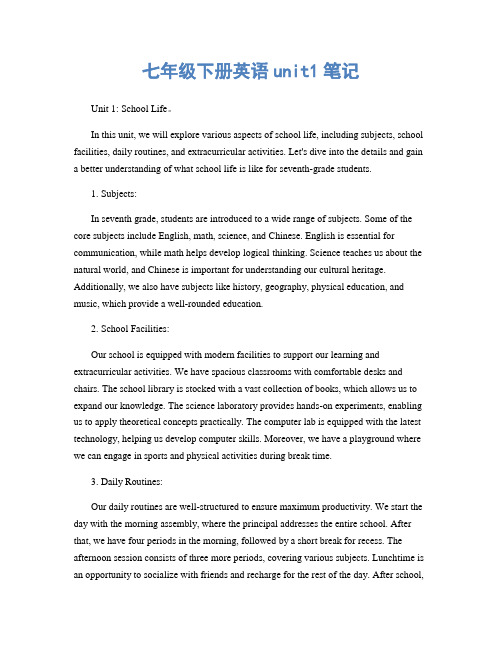
七年级下册英语unit1笔记Unit 1: School Life。
In this unit, we will explore various aspects of school life, including subjects, school facilities, daily routines, and extracurricular activities. Let's dive into the details and gain a better understanding of what school life is like for seventh-grade students.1. Subjects:In seventh grade, students are introduced to a wide range of subjects. Some of the core subjects include English, math, science, and Chinese. English is essential for communication, while math helps develop logical thinking. Science teaches us about the natural world, and Chinese is important for understanding our cultural heritage. Additionally, we also have subjects like history, geography, physical education, and music, which provide a well-rounded education.2. School Facilities:Our school is equipped with modern facilities to support our learning and extracurricular activities. We have spacious classrooms with comfortable desks and chairs. The school library is stocked with a vast collection of books, which allows us to expand our knowledge. The science laboratory provides hands-on experiments, enabling us to apply theoretical concepts practically. The computer lab is equipped with the latest technology, helping us develop computer skills. Moreover, we have a playground where we can engage in sports and physical activities during break time.3. Daily Routines:Our daily routines are well-structured to ensure maximum productivity. We start the day with the morning assembly, where the principal addresses the entire school. After that, we have four periods in the morning, followed by a short break for recess. The afternoon session consists of three more periods, covering various subjects. Lunchtime is an opportunity to socialize with friends and recharge for the rest of the day. After school,some students participate in extracurricular activities, such as sports clubs, music clubs, or art clubs. It is important to maintain a balance between academics and extracurricular pursuits.4. Extracurricular Activities:Participating in extracurricular activities is highly encouraged in our school. It helps us develop skills beyond the classroom and discover our passions. We have a variety of clubs and societies, such as the English Club, Science Club, Drama Club, and Sports Club. These clubs provide a platform for students to explore their interests and showcase their talents. Additionally, our school organizes annual events like sports day, talent shows, and cultural festivals, which bring the entire school community together.In conclusion, seventh grade is an exciting phase of school life, where students are exposed to a diverse range of subjects and activities. With well-equipped facilities and a structured daily routine, we have the opportunity to learn, grow, and explore our interests. By actively participating in extracurricular activities, we can develop skills beyond academics and create lasting memories. Let's make the most of our seventh-grade journey and embrace all the opportunities that come our way.。
人教版七年级下册英语unit1上课笔记

人教版七年级下册英语unit1上课笔记全文共6篇示例,供读者参考篇1Here are some class notes for Unit 1 of the English textbook for 7th grade (lower secondary) from the People's Education Press, written from a student's perspective in around 2000 words:Unit 1 Class NotesHi there! Today we started a new unit in our English textbook. It's called "The Making of a Friend" and it's all about making friends and being a good friend. Miss Li said it will help us learn how to introduce ourselves, ask questions, and describe people's personalities and interests. Sounds fun!The first lesson was about introducing yourself. We learned some sentences like "Hi, I'm..." and "My name is..." to say our names. We also practiced asking "What's your name?" and responding. Seemed pretty easy at first but then Miss Li had us do roleplays introducing ourselves with more details.We had to say where we're from, how old we are, and something about our personalities or interests. I said "I'm David from Shanghai. I'm 13 years old and I really like playing basketball." Lily introduced herself as being shy but loving to read novels.The hardest part was remembering to use "I am" instead of just saying "I" with the details. Like "I am 13 years old" not "I 13 years old." Miss Li caught me messing that up a few times! We'll need more practice.In the next class, we learned how to ask people questions about themselves using "What's your favorite..." and "Do you like..." I asked Lily "What's your favorite food?" and she said dumplings. Then she asked me "Do you like watching movies?" and I said yes, especially comedies.We had to come up with 3 different questions each to ask our partners. Kinda tough to think of different ways to phrase them on the spot! But it was good speaking practice.The readings and listenings were mostly conversations between students introducing themselves and asking about each other's interests. Seemed pretty realistic, though I've never actually met someone who loves insect collecting as much as that guy Paul in the dialogue!We wrapped up the unit by describing our friend's personalities and interests. Miss Li taught us adjectives like "outgoing," "creative," "athletic," etc. And phrases like "My friend is..." or "She/He really enjoys..."In pairs, we each had to write a paragraph describing our partner without using their name, and then read them out loud for the class to guess who we wrote about. I wrote that my friend is very smart, a little shy, and loves reading fiction books. Did you guess Lily?Overall, not too difficult of a unit but lots of repeating and practicing the same kinds of sentences. Miss Li says that's important to get used to the rhythm and patterns before we move on. Next unit is about describing our daily routines, so I bet those "Wh-" question words are going to come in handy again!Let me know if you have any other questions! I'll be happy to share more notes from future units. Making friends through English, here we come!篇2My Class Notes - Unit 1Hey everyone! Today I want to share with you my class notes for Unit 1 in our English textbook. We have been learning so many interesting things, and I can't wait to tell you all about it!Lesson 1: Greetings and IntroductionsIn this lesson, we learned how to greet people and introduce ourselves. It's important to be polite when we meet someone new. We practiced saying "Hello" and "Nice to meet you" in English. We also learned to ask someone's name by saying, "What's your name?" It was so much fun to introduce ourselves to our classmates and make new friends.Lesson 2: Classroom LanguageIn Lesson 2, we focused on learning some useful classroom language. We learned how to ask for help by saying, "Can you help me, please?" and how to offer help by saying, "Sure, I can help you." It's important to be helpful and kind to our classmates. We also learned how to ask permission by saying, "May I go to the bathroom?" and how to ask to leave the classroom by saying, "Excuse me, may I be excused?" These phrases will really come in handy when we need to communicate in the classroom.Lesson 3: Numbers and ColorsLesson 3 was all about numbers and colors. We learned how to count from one to twenty in English. It was a bit challenging at first, but with practice, we all got better. We also learned the names of different colors and how to describe objects using colors. Now we can say things like, "I have a red backpack" or "The sky is blue." Learning colors is so much fun!Lesson 4: Family and FriendsIn this lesson, we talked about our families and friends. We learned how to say different family members in English, like "mother," "father," "brother," and "sister." We also learned how to describe our friends by saying things like, "My friend is funny" or "My friend likes to play soccer." It's great to talk about the people we love and care about.Lesson 5: Hobbies and ActivitiesLesson 5 was all about hobbies and activities. We learned how to talk about the things we like to do in our free time. Some of my classmates shared that they enjoy playing soccer, reading books, or dancing. We also learned how to ask someone about their hobbies by saying, "What do you like to do?" It's a great way to get to know our friends better and find common interests.Lesson 6: Daily RoutinesIn our last lesson, we learned about daily routines. We talked about the activities we do every day, such as waking up, brushing our teeth, eating breakfast, going to school, and doing homework. We practiced using time expressions like "in the morning," "in the afternoon," and "at night" to talk about our daily routines. It was interesting to hear about everyone's different routines.That's all for my class notes on Unit 1! I hope you found them helpful. Learning English is so much fun, and I can't wait to share more with you in the future. Keep practicing and soon we will all become fluent English speakers! Goodbye for now!Word Count: 321 words篇3Here are some notes for Unit 1 in the 7th grade English textbook (PEP Edition) in the style of a primary school student, around 2000 words long:Unit 1 - Hello, New Term!It's a new school term and we're back in class learning English again. Our teacher, Miss Li, seems really nice. She has a big smile and speaks English very clearly.On the first day, Miss Li taught us how to greet each other in English. We practiced saying "Hello", "Hi", and "How are you?" to our classmates. I got to talk to my friend Xiaoming and say "How are you?" He replied "I'm fine, thanks. And you?" I said "I'm great!" It was fun using English instead of just reading from the textbook.We also learned to introduce ourselves by saying "My name is..." and then our name. Miss Li went around the class and we all practiced introducing ourselves one by one. A few students were a bit shy, but Miss Li encouraged them nicely.The next class, we learned numbers from 1 to 100 in English. Counting to 100 was pretty easy, but saying the numbers randomly was harder. We played a fun game where Miss Li would say a number and we had to hold up that many fingers. Whoever was fastest got a sticker! I got three stickers.Then we moved on to learning the English letters and their sounds. The alphabet song really helps remember the order. We did an exercise where Miss Li would say a letter and we had towrite it down. I got most of them right except for a few like 'q' and 'x' that look quite similar in print.This week we also started learning the days of the week and months of the year in English. There are a lot of new words to memorize! We sang songs about the days and months to help us practice. My favorite is the "Monday, Monday" song—it's so catchy!In our reading class, we read a short text about a student named Tom and what he does on different days. It talked about him going to school, doing homework, playing sports etc. We underlined all the days of the week mentioned in the passage.For writing practice, Miss Li had us write a few sentences about our daily routine using "I wake up at..." or "On Monday, I..." etc. I wrote about waking up, eating breakfast, going to school, having classes, playing basketball after school, doing homework and going to bed. Describing my daily life in English was pretty hard at first!We're also starting to learn simple grammar rules. Like how to make sentences negative by adding "don't" or "doesn't". And how to ask questions by changing the word order a bit. It's confusing having to rearrange the words compared to Chinese sentence structure. More practice is needed!There are so many new words and expressions to pick up. Luckily Miss Li is very patient and makes us repeat after her. She also puts up flashcards and posters all around the classroom to help us remember.I'm really enjoying learning English this semester. The activities are fun and Miss Li is a great teacher. I can already say simple greetings, introduce myself, count numbers, name the days and months, and describe my daily routine a little bit. Can't wait to learn more!篇4Here are some class notes for Unit 1 of the 7th grade English textbook (PEP Edition) in about 2000 words, written from the perspective of a primary school student:Unit 1 Class NotesHi there! Today we started a brand new unit in our English textbook. It's called "New Terms at School" and it's all about learning some new vocabulary and phrases related to school life. I'm really excited because I love learning new words in English!The first section was called "Listening and Speaking" where we practiced listening to conversations and dialogues aboutschool subjects, classes, and activities. There were some tricky new words like:Tutor - This means a teacher who gives private lessons. Like if I need extra help with my math, I could get a tutor.Faculty - This refers to all the teachers at a school. So all my teachers are part of the school faculty.Academic - This describes things related to studying and schools. Like academic subjects or an academic record.We also learned the difference between a "course" and a "subject". A course is a whole series of classes on one topic, while a subject is one specific area of study like math or history.The dialogues were really fun to practice. There was one where two students were deciding what clubs or societies to join after school. Things like the art club, computer club, debate society, and more. I'm thinking maybe I'll join the reading club since I love books so much!Then we moved on to the "Reading" section which had a short passage about the typical school day schedule in Britain. I learned that most British students have to wear uniforms which seems kind of boring to me. Their days are divided into "periods" with different classes. They also get study periods and breaks.Apparently UK schools get really long summer holidays which sounds awesome!After reading, we looked at some example sentences using words and patterns like:Look forward to (something)It's a pity that...What's moreSuch asAs well asThe grammar focus for this unit is on using the present tenses to describe routines and schedules. So things like "I have English twice a week" or "We usually have PE on Tuesdays." Using tenses correctly is so important in English.My favorite part was the "Writing" section where we had to write a short paragraph describing our weekly schedule and favorite school subjects/activities. Here's what I wrote:"I'm a student at Greenville Primary School. I look forward to going to school every day because I love learning new things! My favourite subjects are science and art. On Mondays, I have a double period of science in the morning followed by music class.Tuesdays are my busiest days with Chinese, math, and English classes. After school on Tuesdays, I also attend the reading club which is really fun. Wednesdays I have PE class which I enjoy as well as computer class. Thursdays we have art class which is my favourite! I love painting, drawing, and being creative. Fridays there are no clubs but we often watch interesting videos in our last class period. Overall, I have a pretty busy weekly schedule but I don't mind because I love school!"Writing that paragraph helped me practice using present tenses and vocabulary about my school life. I can't wait to learn more new words and phrases in the upcoming lessons!Well, that's a wrap for my notes on Unit 1 so far. We've covered listening, reading, vocabulary, grammar, and writing related to school subjects and schedules. I'm sure there will be more fun activities and practice coming up. Catch you next class!篇5Here are some class notes for Unit 1 of the 7th grade English textbook, written from the perspective of a primary school student in about 2000 words:Unit 1 Class NotesHey guys! It's me again with the notes from our first unit in the new English textbook. This unit was all about daily routines and how people spend their time. It was pretty interesting to learn about what a typical day is like for different people around the world.We started off by reading a few passages about kids our age describing their morning routines before school. I thought Sam's morning was sooo early! He wakes up at 5:30am every day to do his homework and chores before catching the bus at 7:15am. That's insane! I could never wake up that early haha. Amy's morning routine seemed way more chill. She just has a simple breakfast, gets dressed, and walks to school. I'm a lot more like Amy in the mornings.Then we learned all the vocabulary for daily routines and household chores. Words like "make the bed", "wash the dishes", "sweep the floor"...you know, that kind of stuff. Our teacher even had us mime out acting like we were doing those chores. It was pretty funny watching everyone pretend to vacuum or dust the furniture. Maybe we'll put on a chores performance for the next school talent show!The grammar focus for this unit was on telling time and the present simple tense. Telling time was a piece of cake since welearned that ages ago. But the present simple was a little trickier. Like when to use "go" versus "goes", or leave off the "s" for "I" and other pronouns. We did a ton of practice exercises filling in the right verb forms.My favorite part was the cultural corners where we learned about daily life and routines in other countries. Like in Japan, a lot of kids have to clean their school classrooms and halls instead of janitors doing it. Can you imagine having to sweep and mop every day after class? No thanks! I'll pass on that haha.We also read about a teenager from Kenya who has to walk 5 miles to and from school every day since the nearest school is so far away. Plus he has a bunch of chores to do when he gets home too. I couldn't believe how hard his daily routine is compared to ours. It made me appreciate how easy we have it just being able to hop on the school bus or have our parents drive us.For the unit project, we had to create a schedule or daily planner showing our own typical routines throughout the day. I included things like when I wake up, have breakfast, go to school, do homework, play video games, have dinner, and go to bed. My schedule looked pretty boring compared to some of my classmates who are involved in a million different activities!Oh, I almost forgot about the funny skit we watched of two friends arguing over whether one of them was a "morning person" or a "night owl". The morning person kept bugging his friend to wake up early, but his friend just wanted to sleep in every day. It was hilarious seeing them bicker back and forth about their different daily routines. I definitely related more to the night owl!Alright, I think that's everything I can remember from this first unit. Overall, it was a good way to ease back into English class after summer break. Talking about our daily lives made for some pretty simple conversations and writing. Just wait until we get to the really hard grammar stuff later in the year! But for now, I'm off to enjoy my free time before the next school day routine begins.篇6Certainly! Here's a set of class notes for Unit 1 of the 7th Grade English textbook (PEP Edition), written from the perspective of a primary school student, with a length of approximately 2,000 words.Unit 1 Class Notes - FriendshipHey there, friends! It's me, your pal, back with some notes from our English class. Today, we talked about something super important - friendship! Isn't that just the best topic ever? I mean, who doesn't love having awesome friends to hang out with, share secrets, and have loads of fun?Okay, let me start from the beginning. Our teacher, Ms. Wilson, began by asking us what friendship means to us. Hands shot up like rockets, and everyone had something to say. Jessica said it's about being there for each other, no matter what. Tommy talked about how friends always have your back and support you. And little Timmy, bless his heart, said it's about sharing your snacks during recess! Aren't kids just the cutest?After that, Ms. Wilson showed us this really cool story called "Best Friends Forever." It was about two girls, Amy and Lily, who had been besties since kindergarten. They did everything together – from playing hopscotch to sharing their deepest secrets. But then, something happened that put their friendship to the test.Lily's family had to move to a different city, and the girls were heartbroken. They promised to stay in touch, but as time went by, their calls and letters became less frequent. Eventually, they lost contact altogether. Sad, right?Years later, when they were both adults, Amy and Lily unexpectedly ran into each other at a café. At first, it was a bit awkward, but then they started reminiscing about all the good times they had shared. Before they knew it, they were laughing and catching up like no time had passed at all. In the end, they realized that true friendship can withstand any challenge, even distance and time apart.After the story, Ms. Wilson asked us what we thought the moral of the story was. We had a big discussion about how friendship is one of the most precious things in life, and how we should always cherish our friends and make an effort to keep those bonds strong, no matter what.Then, we learned some cool new vocabulary words related to friendship, like "camaraderie," "companionship," and "rapport." We even played a fun game where we had to use those words in sentences. Let me tell you, some of the sentences were hilarious!Next up, we talked about different idioms and expressions related to friendship, like "a friend in need is a friend indeed," "birds of a feather flock together," and "there's no better friend than a sister." I love idioms – they're like little puzzles that make language so much more interesting!Finally, Ms. Wilson gave us a writing assignment. We had to write a letter to our best friend, telling them why their friendship means so much to us. I wrote mine to my bestie, Sarah, and let me tell you, I poured my heart into it. I talked about all the amazing adventures we've had, the secrets we've shared, and how she's always been there for me, no matter what.Whew, that was a lot of stuff, huh? But it was all so much fun!I can't wait for our next English class. Who knows what exciting things we'll learn about next? Maybe we'll talk about family, or hobbies, or even our favorite foods! Whatever it is, I'm sure it'll be a blast.Well, that's all for now, folks. Time to put away my pencil and notebook. But before I go, let me leave you with this thought: cherish your friends, and never take them for granted. They're the ones who make life's journey truly amazing.See you next time!。
人教版七年级下册英语unit1笔记
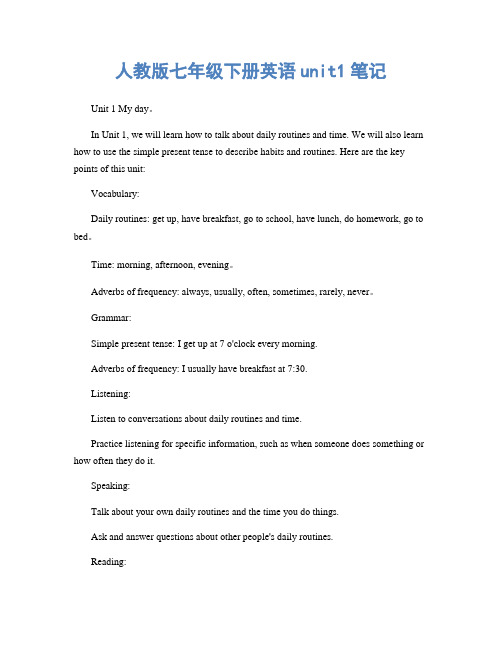
人教版七年级下册英语unit1笔记Unit 1 My day。
In Unit 1, we will learn how to talk about daily routines and time. We will also learn how to use the simple present tense to describe habits and routines. Here are the key points of this unit:Vocabulary:Daily routines: get up, have breakfast, go to school, have lunch, do homework, go to bed。
Time: morning, afternoon, evening。
Adverbs of frequency: always, usually, often, sometimes, rarely, never。
Grammar:Simple present tense: I get up at 7 o'clock every morning.Adverbs of frequency: I usually have breakfast at 7:30.Listening:Listen to conversations about daily routines and time.Practice listening for specific information, such as when someone does something or how often they do it.Speaking:Talk about your own daily routines and the time you do things.Ask and answer questions about other people's daily routines.Reading:Read short passages about people's daily routines and schedules.Understand the main idea and key details of the passages.Writing:Write short paragraphs about your own daily routines or someone else's routines.Practice using the simple present tense and adverbs of frequency in your writing.Culture:Learn about daily routines and schedules in different cultures.Compare and contrast daily routines in different countries.Unit 1 is a great opportunity to improve your English skills and learn how to talk about your daily life. By the end of this unit, you will be able to describe your own daily routines and ask others about theirs. You will also be able to understand and discuss daily schedules in English. Good luck with your studies!。
人教版英语七年级下册第一单元笔记
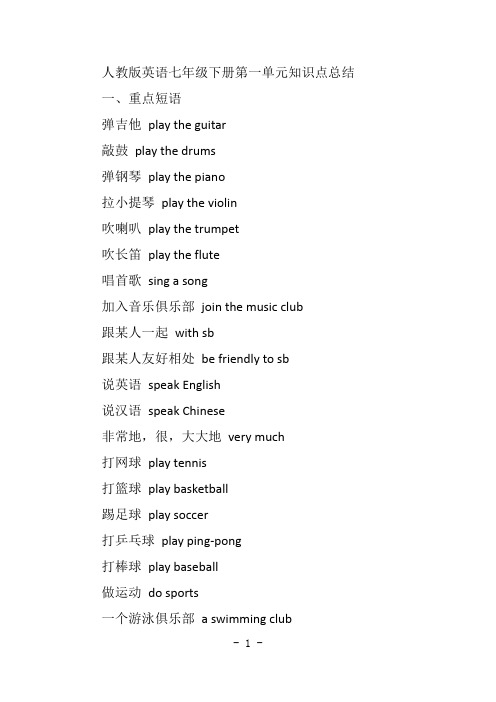
人教版英语七年级下册第一单元知识点总结一、重点短语弹吉他play the guitar敲鼓play the drums弹钢琴play the piano拉小提琴play the violin吹喇叭play the trumpet吹长笛play the flute唱首歌sing a song加入音乐俱乐部join the music club跟某人一起with sb跟某人友好相处be friendly to sb说英语speak English说汉语speak Chinese非常地,很,大大地very much打网球play tennis打篮球play basketball踢足球play soccer打乒乓球play ping-pong打棒球play baseball做运动do sports一个游泳俱乐部 a swimming club讲故事tell stories写故事write stories画画draw pictures在周末on weekends / on the weekend在学校音乐俱乐部at the school music club跟……说talk to/with …..(在电视或广播上)播出put on招新招学生want new students for their school shows帮助他们(学习音乐)help them (with music )在学校演出in the school show擅长做某事be good at跟某人学learn from sb……怎么样?What about…..?更多的运动more sports使学生们度过他们的课余时间make students for their free time需要某人做某事need sb to do sth二、重点句型—Can you swim?—Yes, I can./No, I can't.—What club do you want to join?—I want to join the chess club.You can join the English club.Sounds good./That sounds good.I can speak English and I can also play soccer.Please call XX at XXX for more information.I want to learn about art.We need you to help with sports for English-speaking students.三、单元要点情态动词Can的用法含义:表达人或物的能力或客观可能性,还可以表示请求和允许。
初一下 unit 1 笔记
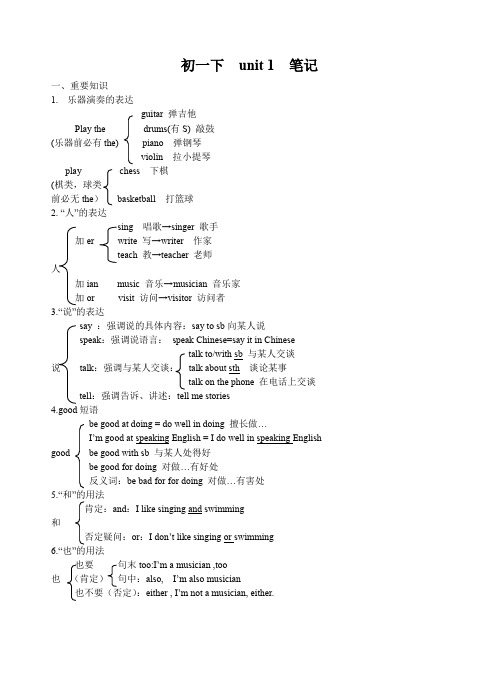
初一下unit 1 笔记一、重要知识1.乐器演奏的表达guitar 弹吉他Play the drums(有S) 敲鼓(乐器前必有the) piano 弹钢琴violin 拉小提琴play chess 下棋(棋类,球类前必无the)basketball 打篮球2. “人”的表达sing 唱歌→singer 歌手加er write 写→writer 作家teach 教→teacher 老师人加ian music 音乐→musician 音乐家加or visit 访问→visitor 访问者3.“说”的表达say :强调说的具体内容:say to sb向某人说speak:强调说语言:speak Chinese=say it in Chinesetalk to/with sb 与某人交谈说talk:强调与某人交谈:talk about sth 谈论某事talk on the phone 在电话上交谈tell:强调告诉、讲述:tell me stories4.good短语be good at doing = do well in doing 擅长做…I’m good at speaking English = I do well in speaking English good be good with sb 与某人处得好be good for doing 对做…有好处反义词:be bad for for doing 对做…有害处5.“和”的用法肯定:and:I like singing and swimming和否定疑问:or:I don’t like singing or swimming6.“也”的用法也要句末too:I’m a musician ,too也(肯定)句中:also, I’m also musician也不要(否定):either , I’m not a musician, either.7. “参加” 的表达参加组织:join:join the dancing club 参加跳舞俱乐部参加参加活动:join in = take part in,join in the after —class activities参加课外活动8.人们:无复数,56 people ,56个人people民族:可有复数,56 people 56个民族a people(×)一个人a person(√)9.house(房子,特指物)+family(家人,特指人)=home(家,指人和物)10.状态:help sb with sthhelp Mr zhao helps us with English.动作:help sb (to) do sth.Mr zhao helps us to study (学) English。
七年级下册英语第一单元知识点笔记

七年级下册英语第一单元知识点笔记一、重点单词1. pal n. 伙伴,朋友;2. pen pal n. 笔友;3. write sth. to sb. = write to sb. about sth. 写信给……4. hear from = receive a letter from 收到……的来信,接到……的信;5. drop sb. a line 给某人写封信;6. every day 每天;7. wait for 等候。
二、重点词组、短语1. write to sb. 给某人写信;2. an e-pal 一个网友;3. want to do sth. 想要做某事;4. write a letter to sb. 给某人写信。
三、句型1. ---What's your name? 你叫什么名字?---My name is Alicia/I'm Alicia. 我叫Alicia。
2. ---What's your address? 你的地址是什么?---My address is 123 Main Street. 我住在Main Street 123号。
3. ---What's your phone number? 你的电话号码是什么?---My phone number is 555-1234. 我的电话号码是555-1234。
4. ---What's your e-mail address? 你的电子邮件地址是什么?**************************************.我的电子邮件地址是******************。
5. ---How do you like to communicate? 你喜欢怎样交流?---I like to write by e-mail. 我喜欢用电子邮件交流。
四、语法聚焦1. 询问某人的姓名或身份:What's your name? 或 May I know your name?2. 询问某人的地址:What's your address?3. 询问某人的电话号码:What's your phone number?4. 询问某人的电子邮件地址:What's your e-mail address?5. 询问某人的年龄:How old are you? 或 What's your age?。
七年级下册语文第一单元作文课堂笔记
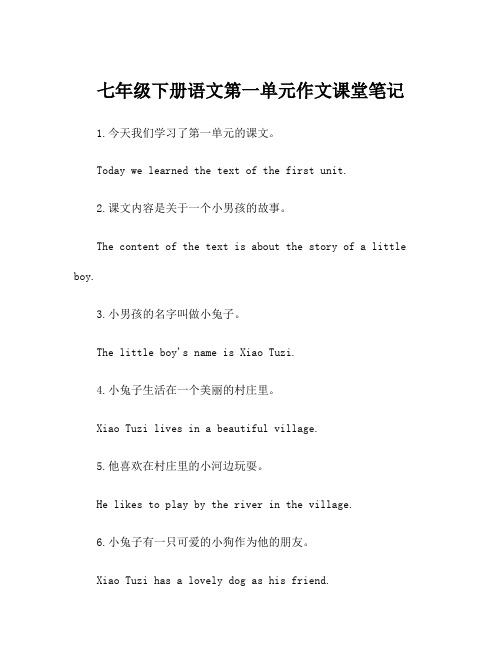
七年级下册语文第一单元作文课堂笔记1.今天我们学习了第一单元的课文。
Today we learned the text of the first unit.2.课文内容是关于一个小男孩的故事。
The content of the text is about the story of a little boy.3.小男孩的名字叫做小兔子。
The little boy's name is Xiao Tuzi.4.小兔子生活在一个美丽的村庄里。
Xiao Tuzi lives in a beautiful village.5.他喜欢在村庄里的小河边玩耍。
He likes to play by the river in the village.6.小兔子有一只可爱的小狗作为他的朋友。
Xiao Tuzi has a lovely dog as his friend.7.他们经常一起探险、玩耍。
They often go on adventures and play together.8.小兔子是一个善良又勇敢的男孩。
Xiao Tuzi is a kind and brave boy.9.小兔子的家人是一个温暖的家庭。
Xiao Tuzi's family is a warm family.10.他们一起生活、一起快乐。
They live together and are happy together.11.我觉得小兔子的故事很有意义。
I think Xiaotuzi's story is very meaningful.12.通过他的故事,我们可以学到很多东西。
Through his story, we can learn a lot.13.比如,勇敢、友情、珍惜。
For example, courage, friendship, and cherish.14.这些都是非常重要的人生价值观。
七年级下册第一单元笔记英语人教版
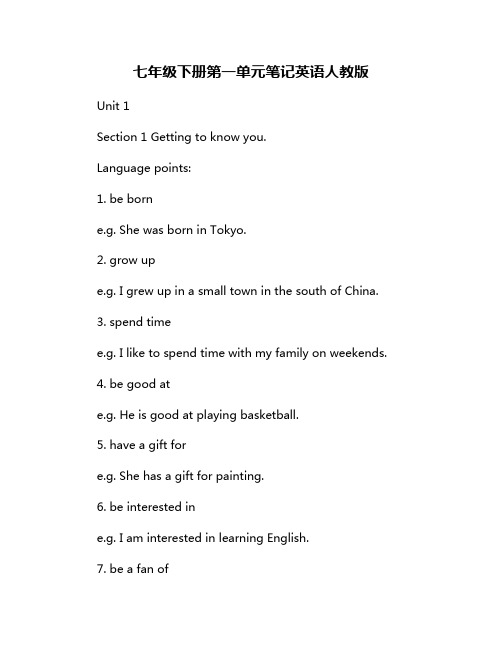
七年级下册第一单元笔记英语人教版Unit 1Section 1 Getting to know you.Language points:1. be borne.g. She was born in Tokyo.2. grow upe.g. I grew up in a small town in the south of China.3. spend timee.g. I like to spend time with my family on weekends.4. be good ate.g. He is good at playing basketball.5. have a gift fore.g. She has a gift for painting.6. be interested ine.g. I am interested in learning English.7. be a fan ofe.g. He is a fan of K-pop music.Vocabulary:1. hobbye.g. My hobby is reading books.2. favoritee.g. What is your favorite color?3. singere.g. She is a famous singer.4. pete.g. I have a pet cat.5. instrumente.g. He plays a musical instrument.6. subjecte.g. What is your favorite subject at school? Exercises:1. Choose the correct verb to complete the sentences.1) She _______ in the USA.a) was born b) has born2) He ________ in London but now lives in Paris.a) grew up b) grows up3) My friend __________ a gift for drawing.a) had b) has2. Fill in the blank with the correct vocabulary word.1) I spend a lot of ___________ reading books.2) She is a fan of a famous ___________.3) My favorite __________ at school is math.3. Write a short paragraph about yourself, using the language points and vocabulary from Unit 1.Overall, Unit 1 provides students with the opportunity to practice introducing themselves and others, talking about hobbies and interests, and using basic vocabulary related to personal information. It lays the foundation for more advanced language learning in the future units.。
英语七下第一单元笔记

英语七下第一单元笔记英文回答:Unit 1: My Community.Topic 1: My Neighborhood.Key Vocabulary: neighborhood, street, house, building, store, school, park, hospital.Grammatical Focus: Present simple tense (positive and negative forms)。
Topic 2: People in My Community.Key Vocabulary: people, family, friends, neighbors, community helpers (e.g., police officer, firefighter, doctor, teacher)。
Grammatical Focus: Questions and short answers usingpresent simple tense.Topic 3: Places in My Community.Key Vocabulary: library, museum, cinema, theater, shopping mall, restaurant, cafe.Grammatical Focus: There is/are (present simple tense)。
Topic 4: Activities in My Community.Key Vocabulary: play, read, watch, listen, shop, learn, help.Grammatical Focus: Present continuous tense.Topic 5: My Community, My Home.Key Vocabulary: community, home, belong, proud.Grammatical Focus: Present perfect tense.中文回答:单元一,我的社区。
人教版七年级语文下册第一课笔记
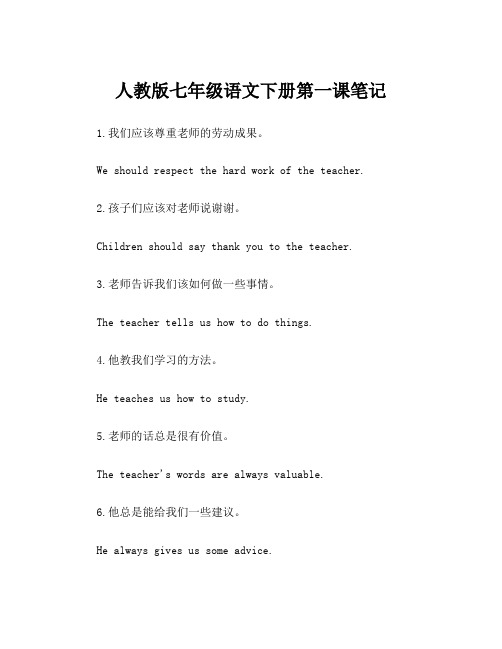
人教版七年级语文下册第一课笔记1.我们应该尊重老师的劳动成果。
We should respect the hard work of the teacher. 2.孩子们应该对老师说谢谢。
Children should say thank you to the teacher.3.老师告诉我们该如何做一些事情。
The teacher tells us how to do things.4.他教我们学习的方法。
He teaches us how to study.5.老师的话总是很有价值。
The teacher's words are always valuable.6.他总是能给我们一些建议。
He always gives us some advice.7.学校里的老师都非常用心。
The teachers at school are all very conscientious.8.老师的辛勤工作让学生们感激。
The hard work of the teacher is appreciated by the students.9.老师们不仅在学业上帮助我们,还给我们树立了榜样。
Teachers not only help us in our studies, but also set an example for us.10.老师的耐心让我们受益良多。
The teacher's patience benefits us a lot.11.我们需要尊重老师的个人空间。
We need to respect the teacher's personal space.12.她总是以身作则,为我们树立了好榜样。
She always leads by example and sets a good example for us.13.老师是如此伟大,因为他们给了我们知识。
Teachers are so great because they give us knowledge.14.他为了我们的学习付出了很多的努力。
七年级下册英语笔记第一单元人教版
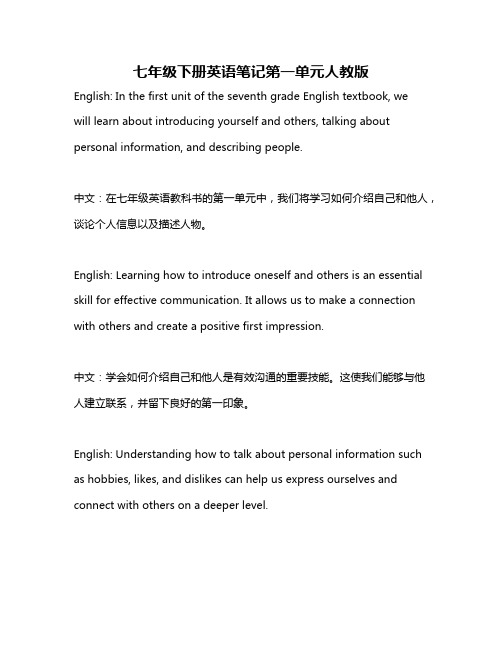
七年级下册英语笔记第一单元人教版English: In the first unit of the seventh grade English textbook, wewill learn about introducing yourself and others, talking about personal information, and describing people.中文:在七年级英语教科书的第一单元中,我们将学习如何介绍自己和他人,谈论个人信息以及描述人物。
English: Learning how to introduce oneself and others is an essential skill for effective communication. It allows us to make a connection with others and create a positive first impression.中文:学会如何介绍自己和他人是有效沟通的重要技能。
这使我们能够与他人建立联系,并留下良好的第一印象。
English: Understanding how to talk about personal information such as hobbies, likes, and dislikes can help us express ourselves and connect with others on a deeper level.中文:了解如何谈论个人信息,比如爱好、喜欢和不喜欢,可以帮助我们更深层次地表达自己,并与他人建立联系。
English: In addition, being able to describe people accurately and descriptively is an important skill for effective communication. It helps us paint a vivid picture of the person we are talking about.中文:此外,能够准确形象地描述人物是有效沟通的重要技能。
七下的笔记人教版英语第1单元

七下的笔记人教版英语第1单元英文回答:To begin with, Unit 1 of the 7th grade English textbook from People's Education Press focuses on the theme of "My New Teachers." This unit introduces students to their new teachers and helps them understand the importance of building positive relationships with them. The unit is divided into three parts: "Listening and Speaking," "Reading," and "Writing." Each part provides various activities and exercises to enhance students' language skills.In the "Listening and Speaking" section, students have the opportunity to listen to conversations between teachers and students. They can practice their listening skills by answering questions and participating in role-plays. For example, they may be asked to imagine a conversation with their new English teacher and discuss their expectationsfor the upcoming school year. This not only improves theirlistening skills but also encourages them to express their thoughts and opinions in English.Moving on to the "Reading" section, students are exposed to different texts about teachers and theirteaching styles. These texts provide insights into the characteristics of good teachers and how they can inspire and motivate students. For instance, students may read a passage about a teacher who uses creative teaching methodsto make learning more enjoyable. They can then discuss the impact of such teaching methods on their own learning experiences.In the "Writing" section, students are guided to write about their new teachers. They can describe their teachers' personalities, teaching styles, and the subjects they teach. This allows students to practice their writing skills and develop their ability to express themselves in written form. For example, students may be asked to write a letter totheir new math teacher, expressing their excitement about learning math and their goals for the subject.Overall, Unit 1 of the 7th grade English textbook provides a comprehensive approach to help students understand and connect with their new teachers. By engaging in various listening, speaking, reading, and writing activities, students can improve their language skills while also developing a positive attitude towards their teachers. This unit not only prepares students for the academic challenges ahead but also fosters a supportive and collaborative learning environment.中文回答:首先,人教版七年级英语第一单元的主题是“我的新老师”。
七年级下册英语课文笔记人教版第一单元
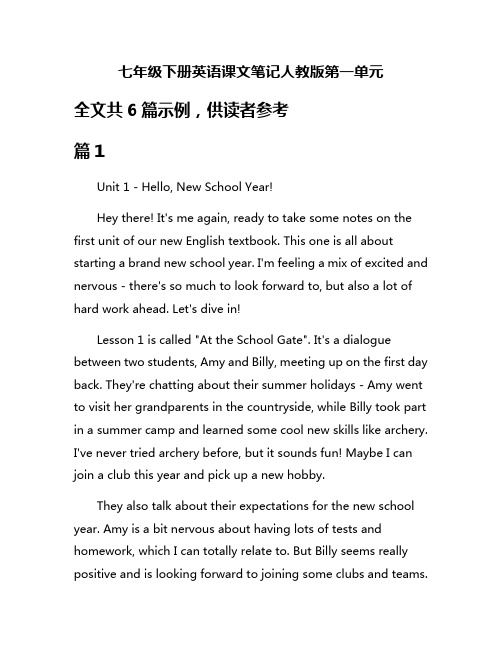
七年级下册英语课文笔记人教版第一单元全文共6篇示例,供读者参考篇1Unit 1 - Hello, New School Year!Hey there! It's me again, ready to take some notes on the first unit of our new English textbook. This one is all about starting a brand new school year. I'm feeling a mix of excited and nervous - there's so much to look forward to, but also a lot of hard work ahead. Let's dive in!Lesson 1 is called "At the School Gate". It's a dialogue between two students, Amy and Billy, meeting up on the first day back. They're chatting about their summer holidays - Amy went to visit her grandparents in the countryside, while Billy took part in a summer camp and learned some cool new skills like archery. I've never tried archery before, but it sounds fun! Maybe I can join a club this year and pick up a new hobby.They also talk about their expectations for the new school year. Amy is a bit nervous about having lots of tests and homework, which I can totally relate to. But Billy seems really positive and is looking forward to joining some clubs and teams.I think having that kind of balanced attitude, being excited but also ready to work hard, is really important.Lesson 2 is "Study Buddies". It's about two friends, Lucy and Polly, who decide to become study partners to help motivate and support each other. They make a plan to have regular study sessions, share notes, and keep each other on track. I absolutely see the value in this! Having someone to study with means you can quiz each other, discuss tricky concepts, and hold each other accountable. Lucy and Polly seem like really good friends too, which makes studying together even better.There are also some reading passages and vocabulary related to school subjects, classrooms, and learning in general. Some words that came up were "semester", "syllabus", "grade", and "tutor". Knowing this kind of academic vocabulary will definitely come in handy as we start knuckling down this year.Lesson 3 is where we start getting into the grammar. This unit covers verb tenses like the simple present, present continuous, and present perfect. These are super important for talking about habits, routines, and things happening now or recently. The examples gave scenarios like "I attend physics club every Wednesday" (simple present for a routine) and "Helen isstudying for her math test" (present continuous for something happening now).The present perfect was a bit tricky for me at first, because you have to use "have/has" plus the past participle. But the more examples I read, the more I started getting the hang of it. It's for things that started in the past and are still ongoing, like "We have attended this school for three years now." Lots of good practice exercises in this lesson!In Lesson 4, we moved on to "School Rules". The dialogue shows a teacher explaining the rules to her class, like being on time, doing homework, participating in class, and treating others with respect. Definitely a good refresher on what's expected of us! There were also some grammar points about using modals like "must", "should", "have to", and "need to" to express rules, obligations, and requirements.One part that really stuck with me was when the teacher said good rules aren't just for following mindlessly, but for creating an environment where everyone can learn effectively. When you think about it that way, the rules make total sense and are super important, even if they don't seem fun at first.The last lesson was "My School Life". It had students describing their daily routines, class schedules, favorite subjects,and extracurricular activities. Reading about their balanced lives - mixing studies, interests, sports, etc. - was really inspiring. I can see how getting involved in the whole school experience, not just academics, can lead to such a well-rounded lifestyle.There was also a writing task where we had to describe our own ideal school day or weekly schedule. Planning that out made me reflect on how I want to spend my time this year in and out of the classroom. Definitely motivating me to make the most of all the opportunities!Phew, that was a content-packed first unit! But I feel like it's set the stage really well for making this a year of growth, learning, and making the most of our school experience. Bring it on!篇2Here are English notes for a 7th grade student on Unit 1 of the PEP English textbook, written from the perspective of a primary school student in around 2000 words:Unit 1 - Experiencing NatureThis unit was all about nature and the outdoors. It had some really cool passages about exploring forests, climbing mountains,and seeing amazing animals! I'm going to write down some notes about what I learned.Passage 1 - A Walk in the WoodsThis was a story about a family going for a hike in the forest.I learned some useful hiking vocabulary like:Trail - the path you walk onBackpack - the bag you carry supplies inCompass - the device that shows you which way is northCanteen - a container for carrying waterThe family saw lots of awesome forest creatures like squirrels, birds, and even a deer! The dad taught the kids about different kinds of trees and plants. At the end they had a picnic lunch out in nature. It sounded like a really fun family adventure.Passage 2 - The HimalayasThis passage was all about the huge mountain range called the Himalayas in Asia. It taught me some mountain words like:Peak - the very top of a mountainSlope - the sides of the mountainGlacier - huge frozen rivers of iceEverest - the highest mountain in the world at 8,848 meters!The passage described how difficult it is to climb the huge Himalayan peaks because of the extreme cold, lack of oxygen, and dangers like avalanches. Only the bravest mountain climbers can make it to the top! I would love to see those giant snowy mountains one day.Passage 3 - Bird WatchingThis one was about the hobby of bird watching, where you try to spot and identify different bird species. Some key terms were:Binoculars - the special double-lens glasses for seeing far awayBirdhouse - the little wooden box for birds to nest inWingspan - the distance from one wing tip to the other when openMigrate - when birds fly to warmer places for winterThe passage explained how to identify birds by their colors, songs, behaviors, and habitats. It said early morning is the best time for bird watching. My favorite was learning about theincredible long-distance migrations some birds make every year, like the Arctic Tern that flies 44,000 miles!Passage 4 - The SerengetiThe last passage described the amazing Serengeti region of Africa, which is home to huge numbers of wild animals. I learned words like:Savanna - the flat grassland landscapeHerd - a group of animals togetherGraze - to eat grass and plantsPredator - an animal that hunts others for foodIt talked about the spectacular annual migration of millions of wildebeests, zebras, and gazelles searching for greener grasslands. And the predators like lions, leopards and cheetahs that stalk them. I would go crazy seeing all those exotic animals roaming free! The Serengeti sounds like an awesome adventure safari.Overall this unit made me really excited to experience more of the outdoors and nature. I can't wait for my next camping trip or hike so I can look for cool birds, plants and wildlife. Gettingout in green spaces is so much fun and so good for observing the amazing natural world around us.篇3My Awesome Notes on Unit 1 of the 7th Grade English BookHey guys! It's me again with more sweet notes to help you rock that 7th grade English class. Unit 1 was all about food, cooking, and making yummy stuff to eat. I took tons of notes so you can get an A+ on those tests and quizzes. Let's dig in!The first lesson was called "The Cakes." It was about this girl named Huihui who loved baking cakes. Her mom let her bake a chocolate cake all by herself for the first time. I wish my mom would let me bake on my own! Anyway, Huihui followed all the steps carefully - mixing, baking, letting it cool down. When it was done, she decorated it with colorful icing and strawberries. Doesn't that sound delicious?The lesson had lots of vocabulary about baking ingredients like flour, sugar, butter, and instructions like "preheat the oven" or "grease the pan." We also learned words for kitchen tools like a spatula, mixing bowl, and measuring cups/spoons. Knowing all those words will really help if you want to bake up a storm yourself!Next up was a funny dialogue called "Do you Like Dumplings?" It was about two friends, Zhang Lei and Wang Wei. Zhang Lei's mom made a huge batch of dumplings and he didn't want to eat them all. So he tried to get Wang Wei to take some by asking "Do you like dumplings?" But Wang Wei is a picky eater and kept saying no to every kind of dumpling!From this dialogue, we practiced using the phrase "Do you like..." to ask about people's food preferences. We also saw how to respond with "I like..." or "I don't like..." Plus vocab for different dumpling fillings like pork, beef, vegetables, eggs. My favorite is still the classic pork dumpling though!After that was a really interesting text called "Making Naan." It described the whole process of how this type of Indian bread is traditionally made. First, the dough has to be kneaded and left to rise. Then little oval-shaped pieces get rolled out flat. The cool part is they get slapped onto the super hot walls of a tandoor clay oven! In just a minute or two, the naan puffs up and gets all crispy and bubbled on the outside while staying soft inside.This reading introduced us to words like knead, dough, yeast, toppings, garlic butter, etc. We also saw sequence words like first, next, then to describe the steps in a process. I tried making naan at home by baking it in the oven and it turned out pretty good!One day I'll have to go to an authentic Indian restaurant and taste the real tandoor-baked kind.The last part was a section all about cooking verbs. We learned words like whip, toss, drizzle, grate, dice, mince, and more. They described cooking techniques like whipping cream, tossing a salad, drizzling olive oil, or grating cheese. Then there were action verbs for cutting like chop, slice, dice, and mince. I think my favorite new verb was "to caramelize" which means heating sugar until it turns that amazing brown color. Yum!Using these verbs, we had to unscramble sentences about how to make certain dishes step-by-step. Like "First dice onion the the. Then oil heat olive in pan a." Or "add vanilla last, the extract At." It was awesome practice for understanding recipe instructions.Overall, this whole unit made me super hungry just reading and talking about all that delectable food! I can't wait to become a master chef one day. Let me know if you need any other sweet notes to ace 7th grade English. I'm always here to help my friends! Peace out!篇4Unit 1 - My AbilitiesThis unit was all about talking about what we can and can't do. It had a lot of really useful phrases for expressing abilities that I'll definitely need to know for the future.The first text was a really cool story called "The Monkey King Conquers the Demon". It was from the classic Chinese novel Journey to the West. The Monkey King was this super powerful monkey who could do all sorts of incredible things like transform into different creatures, travel vast distances in the blink of an eye, and pluck out hairs that turned into whatever he wanted. In the story, he used his abilities to fight the Demon King and save his monkey tribe. It was an epic battle between good and evil, reminding me of some of the superhero movies I love.We learned modal verbs like "can", "could", "be able to" to talk about abilities. Like "The Monkey King could fly" or "He was able to summon clouds to fight the Demon King." Being able to use modals correctly is important to express what people are capable of doing in English.The next reading was totally different - it was a biographical passage about Helen Keller. She was an amazing woman who overcame being blind and deaf through sheer determination. Even though she couldn't see or hear, she was able to learn toread, write, speak, and ultimately graduate from university through the help of her teacher Anne Sullivan.The passage used a lot of negative modal phrases like "couldn't see", "was unable to hear" to describe Helen's disabilities. But it also had positives like "learned to read Braille" and "was able to attend university" to show how capable she became. Her story proves that disability doesn't have to disable your dreams if you work hard. Helen Keller is a real inspiration!There were some practice exercises drilling us on using modals properly, like filling in sentences with the right form of "can", "could", etc. Making sure we can use modals accurately is key for the test. My teacher also had us do some fun roleplays acting out what we could and couldn't do as different characters.Towards the end of the unit, we read an informative text comparing the abilities of different animals. Did you know that seals can hold their breath for over 2 hours when diving? Or that camels can go for weeks without water? The passage was full of fascinating facts using "can" and "be able to" to highlight unbelievable animal skills.My favorite part though was the last text - a hilarious modern story called "The Smelly Sneakers". It was about this boy who got a new pair of smelly sneakers for his birthday thatseemed to have a mind of their own. No matter what his mom did, she couldn't remove the awful stench! In the end, the sneakers turned out to be an alien creature in disguise. It was such a silly, imaginative tale full of lines like "His mom couldn't believe her nose!"To wrap up the unit, we had to write our own short stories using the language we learned about abilities. I wrote about getting superpowers for a day and all the cool things I would suddenly be able to do, like fly and shoot lasers from my eyes! It was great practice putting modal verbs into an original narrative context.Overall, I feel like this unit gave me a really strong grasp on how to properly express what people, animals and even objects can and cannot do using modals. Those skills will undoubtedly come in handy for writing and speaking English in the future. Bring on the next unit - I can't wait!篇5Here are English notes on Unit 1 of the PEP English Textbook for Grade 7 (Volume 2), written in a style suitable for elementary school students, approximately 2,000 words long:Unit 1: A Day in My LifeHi there! My name is Emma, and I'm a 7th grader. In this unit, we're learning about daily routines and how to describe our day-to-day activities. It's super cool because we get to talk about our lives and the things we do every day. Let me share with you what a typical day looks like for me!My day starts pretty early because I have to get ready for school. My mom's the one who wakes me up at around 6:30 in the morning. I don't like waking up that early, but I have to go to school, so I don't have a choice. After getting out of bed, I brush my teeth and wash my face. Then, I get dressed and make sure I look presentable for school.Once I'm ready, I head downstairs for breakfast. My favorite breakfast is pancakes with syrup and some fruit on the side. Yum! While I'm eating, my mom packs my lunch for school. She always includes a sandwich, some snacks like crackers or granola bars, and a juice box or bottle of water.At around 7:30, my dad drives me to school. The ride takes about 15 minutes, and we usually listen to music or chat about our plans for the day. Sometimes, I do some last-minute homework in the car if I didn't finish it the night before. Oops!School starts at 8:00, and my first class is English. We learn a篇6Unit 1 - My Favourite SeasonThis unit is all about the different seasons and what activities we like to do in each one. It starts off with a nice reading passage called "My Favourite Season is Spring." Let me tell you what it's about!The passage is written by a student named Li Hui. She says spring is her favourite time of year because everything looks so fresh and new after the cold winter. The trees start growing green leaves again, and lots of colourful flowers bloom like roses, tulips and peonies. How pretty!Li Hui really enjoys going outside in spring after being stuck indoors for so long. She likes flying kites with her little brother and playing jump rope or badminton with her friends in the park. Doesn't that sound fun? Spring also means school picnics where you can run around and play games with your classmates.Another great thing about spring is all the yummy fruits and veggies that are in season. Li Hui's favourite spring snacks are fresh strawberries, cherries, sugar snap peas and asparagus. Her mom makes her all kinds of tasty dishes with seasonal ingredients. I'm getting hungry just thinking about it!At the end, Li Hui says spring symbolizes hope, growth and new beginnings after winter. Everything seems so full of life and energy. She really captures the joy and excitement of springtime through her descriptive writing. Reading it makes me look forward to spring too!After the reading, there are some exercises to build our vocabulary and grammar skills related to the seasons and activities. Let me share some key words and phrases I learned:VocabularyBloom - When flowers start opening upBlossom - Another word for a flower bloomingKite flyingJump ropePicnicSeasonal fruits/vegetablesGrammarSimple present tense for describing habits (I play, she makes, etc.)Present continuous for ongoing actions (Trees are growing leaves)We also practiced asking and answering questions using the simple present and present continuous, like "What do you usually do in spring?" and "What are you doing this weekend?"The last part was a writing exercise where we had to describe our own favourite season and explain why we like it best. I wrote about summer because I love going swimming, having sleepovers, and not having to go to school! What's your favourite season?Overall, this unit helped me appreciate the changing seasons more. Each one has its own special charm and activities to look forward to. I'm excited to learn about the other seasons in the upcoming units!。
七年级下册英语第一单元课堂笔记人教版
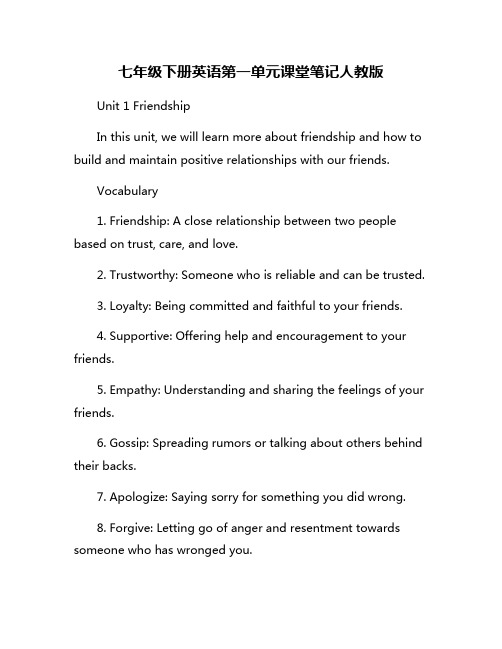
七年级下册英语第一单元课堂笔记人教版Unit 1 FriendshipIn this unit, we will learn more about friendship and how to build and maintain positive relationships with our friends.Vocabulary1. Friendship: A close relationship between two people based on trust, care, and love.2. Trustworthy: Someone who is reliable and can be trusted.3. Loyalty: Being committed and faithful to your friends.4. Supportive: Offering help and encouragement to your friends.5. Empathy: Understanding and sharing the feelings of your friends.6. Gossip: Spreading rumors or talking about others behind their backs.7. Apologize: Saying sorry for something you did wrong.8. Forgive: Letting go of anger and resentment towards someone who has wronged you.9. Conflict: A disagreement or argument between friends.10. Compromise: Finding a solution that works for both sides in a conflict.Grammar1. Present Simple Tense: Used to talk about routines, habits, and general truths.Example: I play soccer with my friends every Saturday.2. Present Continuous Tense: Used to talk about actions happening right now or in the near future.Example: I am meeting my friend for lunch tomorrow.3. Adverbs of Frequency: Used to talk about how often something happens.Example: I sometimes go shopping with my friends on weekends.4. Expressing preference with "like" and "love"Example: I like playing video games with my friends.5. Expressing obligation with "have to"Example: I have to call my friend to apologize for being late.Reading and WritingWe will read stories, dialogues, and letters about friendships to understand how to communicate effectively, resolve conflicts, and show empathy towards our friends.Listening and SpeakingWe will listen to conversations, interviews, and songs about friendship and participate in discussions, role-plays, and presentations to improve our listening and speaking skills.Homework1. Write a paragraph about a time when a friend helped you in a difficult situation.2. Create a dialogue between two friends who are apologizing to each other after a disagreement.3. Listen to a song about friendship and write a reflection on its meaning to you.Let's work together to build strong and lasting friendships with our classmates and friends!。
- 1、下载文档前请自行甄别文档内容的完整性,平台不提供额外的编辑、内容补充、找答案等附加服务。
- 2、"仅部分预览"的文档,不可在线预览部分如存在完整性等问题,可反馈申请退款(可完整预览的文档不适用该条件!)。
- 3、如文档侵犯您的权益,请联系客服反馈,我们会尽快为您处理(人工客服工作时间:9:00-18:30)。
Unit 1 Can you play the guitar?
七年级下第1单元课堂笔记
⏹词组与结构(做到会读、会写、会用)
A.play chess speak English art club swimming club
tell stories be good at play volleyball school show
talk to after school telling stories club do kung fu
B.play the violin tell stories play games with… in ……club
be free old people’s home be good with call sb at …
have time make friends with on the weekend in July
be busy doing be busy with play the guitar play the drums English-speaking students the Students’ Sports Center
help (to) do help sb with sth want do do like to do / doing musicians wanted for School Music Festival music teacher wanted 【注意】定冠词the用在乐器前。
⏹语法与句式
1.情态动词初认识(详见课本110页讲解部分)
2.你想加入什么社团? What club do you _____ _____ _____ ?
我想加入游泳兴趣小组。
I _____ _____ _____ swimming club.
他想加入讲故事小组。
He ______ ______ ______ the story telling club.
3.为了学校汇演我们需要学生。
We ______ students for the school show.
在敬老院我们需要帮助。
We ______ help at the old people’s home.
我们需要你帮助讲英语的学生进行运动。
We ______ you to help with sports for
English-speaking students.
学校需要帮忙教音乐。
The school ______ help to teach music.
4.请放学后找张老师谈。
Please ______ ______ Mr. Zhang after school.
5.我还会踢足球。
I can ______ play soccer.
我也会唱歌和跳舞。
I can sing and dance, ______ .
6.七月份你有空吗?______ you ______ in July?
放学后你忙吗?______ you ______ after school?
周末你有时间吗?______ you ______ ______ on the weekend?
7.你很擅长于讲故事。
You ______ very ______ ______ telling stories.
你善于和老人相处吗?______ you ______ ______ old people?
游泳对身体有好处。
Swimming ______ ______ ______ our body.
英语老师对我们可好了。
Our English teacher Joe King _____ _____ _____ us.
阅读与写作
I can do it by myself! When I was three years old, I tried my first time to swim in the swimming pool. My mother thought that I don't know how to swim, so she asked me "Can I swim with you, and help you?" I said that I can swim by myself. "Really? Are you sure?"asked my mom. "Yes, I'm sure."
So, I started swimming. After the swim, my mother thought that 我很擅长游泳, so she took a swimming class for me. I am so happy! So now, my mother and father said I am fantastic swimmer.
Another thing that I can do it by myself is ice-skating.
At America, I started to learn Ice-skating. At the first time of taking my ice-skating class, my mother said that if she can skate on the ice. I disagreed. I am so mad because my mom does not want me to ice-skate by myself. Then, my mom gave me big thumb.
The last thing that I can do it by myself is that I can cook by myself. One day, my grandmother said that if I can learn to cook. My grandmother said that if she can teach me to make noodles I said the same thing:"I can do it by myself!" My grandma was laughing so hard that she can not hold her breath!"You can't make noodles by yourself! What if you cut your hands?"
" But can I try? "I asked my grandma with a small voice. "Fine! Then you do what you want to do, but be very careful!!!" Yes! I thought myself.
I think that I can do everything by myself if I want to do it.
1.What can the writer do? A. swim B. ice-skate C. cook D. dance
2.What’s the Chinese meaning of the word “thumb”? __________
3.Can you choose(挑选) a title(题目) for this passage(短文)?
I can do it by myself I can do everything I can swim
I can cook noodles I can learn to ice-skate I can cut my hands
4.我很擅长游泳。
翻译成英文:_____________________________________
5.请把画线句子翻译成汉语:_______________________________________。
